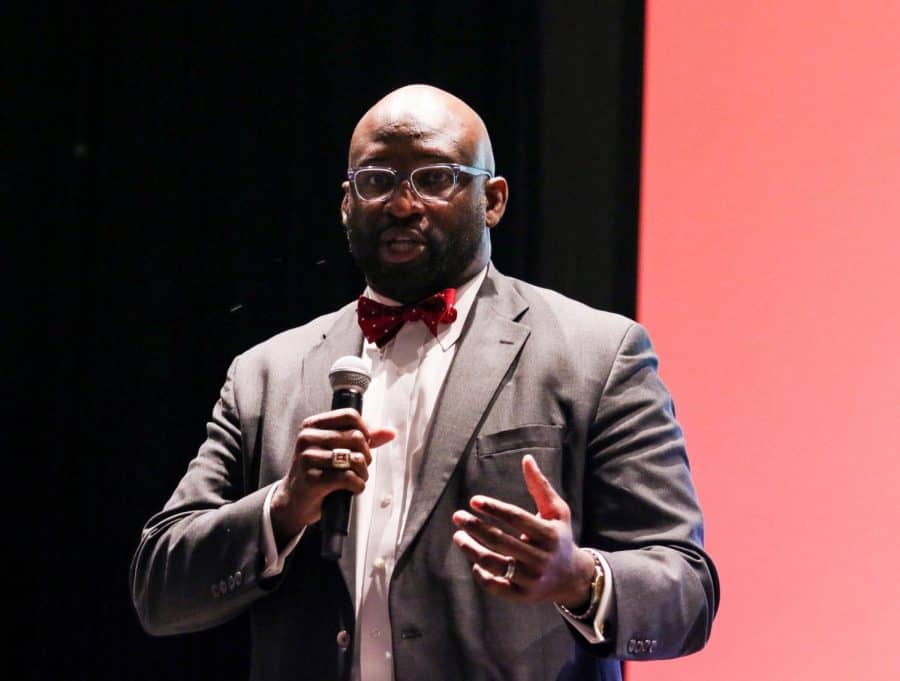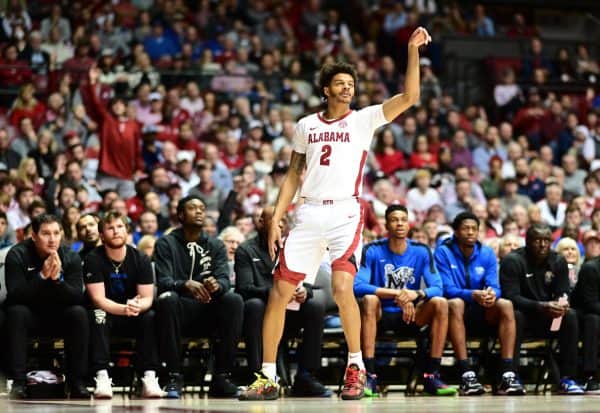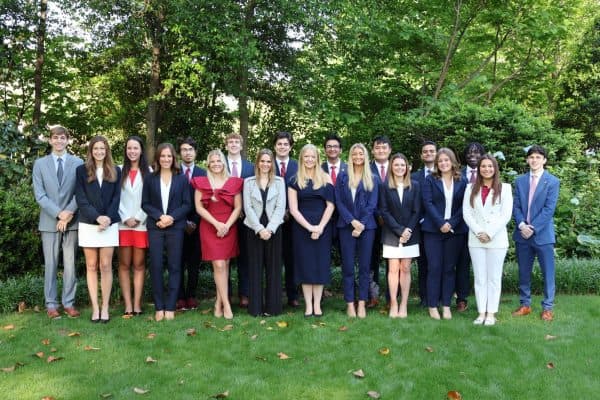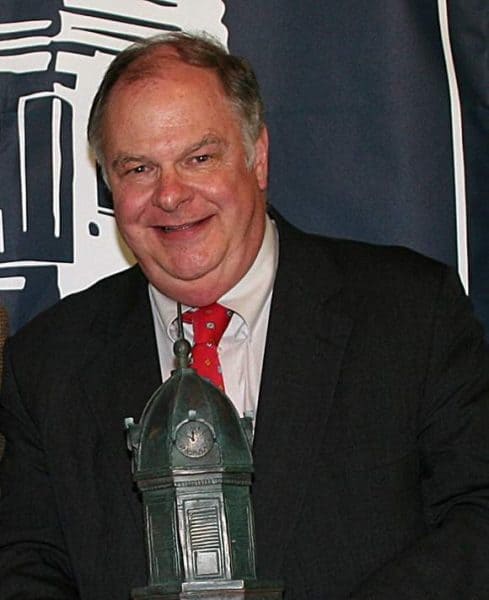CANDIDATE RECAP: Pope draws on scholarship, strategies in second VPSL presentation
January 16, 2020
Myron Pope is a data person. That was clear in his presentation to a Ferguson Theatre audience on Jan. 16, when he laid out his vision and values for student life.
Pope, a UA alumnus, was the second of five candidates to present for the open position of the vice president for student life (VPSL). The position opened up in late July, when the former VPSL, David Grady, resigned. An 11-member committee, announced in late September, narrowed down the search to five candidates, who will each present at the Ferguson Center Theatre over the next two weeks.
In front of an audience of about 120 students and faculty, Pope opened his presentation with the video below:
Pope grew up in Sweet Water, Alabama, where his mother was a K-12 educator in a town of less than 500. The video was a way to describe his time at the Capstone, as an in-state student in the late ‘80s.
“I know what my experience was during my time here as a student,” he said. “It was probably like a 1950s pitstop.”
Pope came to The University of Alabama’s Capstone Honors Program in 1988, when the student body was barely half of what it is now. The University’s recent expansion, he said, resulted in a more diverse population – one that was totally different from the one he saw as a student. One of Pope’s key values, and what brought him back to the University, was a goal of making campus life collaborative, collegial and respectful in a diverse environment.
“If you are content with where you are, you’re going to fall behind,” he said. “We have to make sure we walk the walk.”
Pope noted that the University has always faced challenges in respect to diversity, equity and inclusion.
“I’m very well aware of what’s been happening in the past semester,” he said, referencing the resignation of the former UA dean of students. He also referenced racism he witnessed as a student, citing blackface incidents and the booing of a black Homecoming queen. He noted that these kinds of incidents create a climate that “impacts [students’] ability to be socially engaged or integrated at the institution.”
Pope’s presentation was full of metrics reflecting similar challenges at the University of Central Oklahoma (UCO), as well as strategies he’s used to combat them.
After receiving his doctorate degree in higher education administration, Pope spent 15 years in student affairs at OCU, where he oversaw a $47.4 million budget, led a summit for black male students, increased international student enrollment by 31% and was involved in a number of initiatives targeted at increasing college admission, retention and graduation among youth in underserved local schools.
Pope also has executive experience in corporate, nonprofit and state agencies, such as a recent position at the Oklahoma Department of Human Services. Along the way, he’s published several works on race and gender issues in student affairs.
Mental health, DEI, co-curricular learning, student success and fraternity and sorority life were some of Pope’s picks for the most pressing issues facing flagship universities. Intentionality, he said, is key in adapting the environment to make all students successful.
Especially regarding mental health, Pope noted that students who are gendered, racial or belong to sexual minorities face specific challenges. He cited an instance of black male students at UCO who were performing at a 20% lower rate than the rest of the student body.
“If I’m driving down the road and I have a flat tire, I have to fix the flat tire,” Pope said, noting that it was important to tackle the root causes, such as masculinity, or language barriers in the case of many international students.
Harking back to the pitstop video, Pope stressed that it was important to make sure student affairs processes “remained relevant in evolving times.”
PUBLIC COMMENT
As the floor opened up for questions, André Denham, president of the Black Faculty and Staff Association, asked about how to address communication challenges in an age where students are more connected than they’ve ever been. Pope referenced sit-downs he’s held with students and addressing information gaps institutionally.
Christine Taylor, the vice president for diversity, equity and inclusion (DEI), asked Pope about collaboration, specifically in highly decentralized settings. He talked about being intentional in terms of reaching out across departments, referencing a book, “Learning Reconsidered,” noting that it takes trust and transparency.
An audience member in Housing and Residential Communities asked about how DEI factors into recruitment and retention.
“It’s not [Taylor’s] job,” Pope said. “It’s all of our jobs to do this.”
For Pope, the issue must be tackled on three fronts. The first front is recruitment and retention of students. For Pope, this means looking at data on success rates and being vigilant in recruiting in-state students.
Secondly, the University would have to enhance recruitment and retention of faculty and staff. Pope referenced an article he wrote about minority student perceptions of mentoring.
“Students want to see someone who look[s] like them on campus,” Pope said. “We’re not going to change the face of this institution overnight, but strategically, do we have the practices… are we growing our own?”
The third front called for diversity of curriculum, something Pope instituted at his former institution, according to his curriculum vitae.
The VPSL also governs the office of student conduct, so, if chosen for the job, Pope would be in charge of student discipline. In response to a question about his views on restorative justice, Pope said he was a strong believer in student development and wanted to approach student discipline in terms of developing programs and sanctions aligned with restorative justice.
Earlier in the presentation, Pope, a member of Phi Beta Sigma, presented on fraternity and sorority life in a fairly positive light, noting opportunities for philanthropy and community service, as well as high average GPAs and opportunities for education on hazing and sexual assault.
Mac Griswold, director of support programs in the Capstone Center for Student Success, asked about how Pope would talk about fraternity and sorority life and work with a student body that is roughly one-third Greek while addressing concerns of undue influence from the Greek system.
Pope said it was important to be proactive and build relationships on the front end, like working with fraternity and sorority advisors. “Trust and transparency” is needed, he said, where external intervention can be problematic.
Another audience member asked how Pope was going to sit at the table and advocate for students when sometimes politics can be bigger than life. Pope, whose mother was the first in a family of sharecroppers to go to college, said her degree changed their lives.
“I said ‘student first, student focused,’” he said. “I mean that … My role is to be at that table and advocate for students, not because it’s my job, but because it’s what I believe in.”
Finally, Pope was asked about how students will be able to voice their concerns with him, especially after a semester in which several students felt like that wasn’t possible in this current administration.
[READ MORE: Members of the UA community ask for an end to the silence]
Pope stressed that communication was key, but that he would tell students if a demand was unrealistic.
“I appreciate an environment where we are able to sit down and talk to one another,” he said. “I certainly will be out talking … What would you like to see happen? I’ll tell you if it’s not possible.”
You can view a livestream of the talk here and the Q&A here. Pope’s CV and an evaluation form are available on ua.edu/vpsl through your myBama login until the end of the day on Friday. Candidate information and feedback forms open the day before each presentation and close the day after. The next candidate will present at the Ferguson Center Theatre on Friday, Jan. 17 from 11 a.m. to 12:30 p.m.
Stay tuned for continued coverage of this search process.











